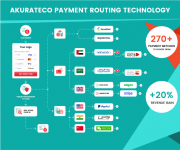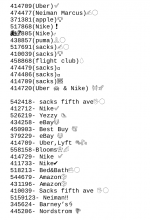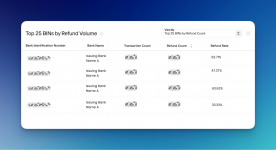d0ctrine
Diamond
- Joined
- 17.08.24
- Messages
- 107
- Reaction score
- 4,250
- Points
- 93

Every fucking day I see the same shit - carders obsessing over BINs like theyre magic lottery numbers. 'What BIN works for Amazon?' 'Need BIN for Best Buy!' The Telegram groups are a cesspool of BIN-beggars who think finding the right number sequence is their golden ticket. Its not that simple and this lazy mindset is holding you back from understanding how this game and the systems that govern it really works.
Addendum: I didnt need to say this but thats written here only applies to general carding and not for methods that require specific BINS to bypass like Apple Pay etc. Dont be a retard and think 'bins are useless because d0ctrine says so!'. Always use your brain and comprehend what you read.
Why BINs Matter (But Not As Much As You Think)
Lets get real - yes BINs play their part in the carding ecosystem. Hell Ive written guides telling you to keep track of working BINs and I maintain my own database of bins with successful hits. Theyre also effective in knowing which bins have 3DS which do not. But theres method to this madness and its not just about collecting numbers like fucking Pokemon cards.
The reasons are multifaceted but heres some factors why certain BINs perform better than others:
1. Transaction Sensitivity
- Trigger fewer red flags for specific transaction types
- Different merchants have different risk tolerances for certain issuing banks
- Historical fraud rates affect how transactions are processed if there are less fraudulent transactions for specific bins transactions will go through better.
2. Anti-fraud System
- Each payment processor has their own blacklists and whitelists
- Some systems are programmed to auto-decline specific BIN ranges
- Regional preferences can affect acceptance rates
3. Security Feature Variations
- Not all banks implement the same level of transaction monitoring
- Some BINs have delayed or non-existent SMS notifications
- Transaction amount triggers vary by issuing bank
4. 3DS
- VBV BINs handle 3DS authentication differently
- Some banks have weaker 3DS implementation leading to more skips/auto-process
- Legacy systems may process 3DS 2.0 inconsistently
These factors are very real variables that can make or break your transactions. So real in fact that legitimate merchants spend millions studying BIN patterns to route different BINs to different processors and maximize their acceptance rates and profits. Even the biggest payment processors cant control everything - banks and card networks have their own agendas risk models and processing quirks that operate as black boxes.
Think about it - when a multi-billion dollar corporation with an army of data scientists still has to play this BIN optimization game you know this shit runs deep. But heres where most rookie carders fuck up: they think identifying a 'good BIN' is the end game when its really just one piece of a complex puzzle. Focusing solely on BINs is like trying to pick a lock while ignoring how the fucking mechanism works. You need to understand the whole system not just one component.
Why Not BINs
Focusing solely on BINs is like staring at a single puzzle piece while ignoring the whole fucking picture. Modern anti-fraud systems are sophisticated beasts that analyze dozens of data points in real-time and thinking you have a magic bin number to bypass these systems is an insult to the tens and thousands of hours these smart engineers spent trying to perfect their systems.
To give you an example: when you card Amazon certain BINs might have better success rates - but not because Amazon has a 'BIN whitelist'. Those BINs work because they align with legitimate customer profiles in that region have appropriate credit limits for the purchase amount and match historical shopping patterns. The BIN is just one signal in a massive risk calculation that happens in milliseconds.
Think about it - these systems are processing millions of transactions per day built by teams of PhDs and security experts whove seen every trick in the book. Theyre not just checking if your card starts with the right numbers - theyre running your entire transaction through AI models trained on years of fraud data.
Heres the brutal fact: You could have the most amazing BIN in existence but youll still get fucked if:
And thats just scratching the surface. Each of these factors carries weight in the risk scoring algorithm and they all need to align perfectly for a successful transaction. A 'good BIN' means fuck-all if the rest of your setup is sloppy.
Why BINs Can Be A Trap
Heres the fucked up part: fraud detection systems are constantly evolving and learning from every transaction. When you use a 'good' BIN youre actually contributing data that helps these systems identify and block that BIN in the future. Its a self-defeating cycle - the more fraudsters pile onto a working BIN the faster it gets burned and becomes useless. Each successful fraud adds another red flag to that BINs profile gradually destroying its effectiveness until its completely dead. So not only is it a trap but by using the same BIN over and over again youre actively helping the fraud prevention systems build against you.
Even worse are carders running sloppy poorly configured setups that trigger unnecessary 3DS challenges - challenges that could have been avoided entirely. Due to their lack of understanding they mistakenly believe their only solution is to use non-VBV bins. Ive watched countless newcomers waste money buying these non-VBV bins when any bin would have worked fine. They end up getting declined anyway because the bin wasnt the root cause of their problems in the first place.
The Cold Hard Truth
The 'magic BIN' mindset is a dangerous fucking trap that keeps you stuck in amateur hour. While experienced carders understand BINs are just one tool in their arsenal newbies treat them like some mystical skeleton key thatll unlock any transaction. Heres the raw truth: obsessing over BINs prevents you from learning how modern fraud prevention systems actually operate. Youre basically jerking off to a single puzzle piece while ignoring the whole damn picture.Think about it - professional carders dont succeed because they found some magical BIN list. They succeed because they understand the entire fraud ecosystem and use BIN data strategically as part of a comprehensive approach. Meanwhile noobs are out here thinking they just need to find the 'right BIN' to get their transactions approved completely missing the point that modern anti-fraud is analyzing dozens of other signals simultaneously.
This BIN fixation is like trying to rob a bank by only studying the guard rotation schedule. Sure you know when the shifts change but youre still fucked if you dont understand the camera systems motion sensors silent alarms vault mechanics response protocols and the dozens of other security measures in place. You need to see the whole security infrastructure not just fixate on one component. Youre setting yourself up for failure by refusing to learn how the whole system works.
Last edited:







